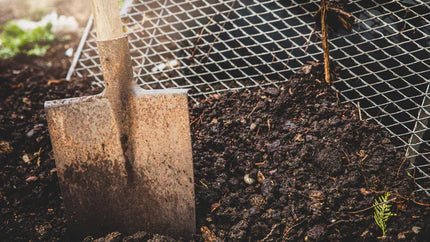Composting 101
Let’s talk about composting: it’s like nature’s way of turning your kitchen and garden waste into a powerhouse soil booster! Composting may sound like an advanced gardening move, but trust me, it’s just a glorified way of letting stuff rot in a controlled manner. Georgina folks, this one’s for you, and don’t worry—small space gardeners, I’ve got your back too!
What Is Composting?
Composting is the process of breaking down organic materials (like veggie scraps, grass clippings, and fallen leaves) into a nutrient-rich soil amendment called compost. It’s like a buffet for your plants, packed with nutrients that improve soil structure, retain moisture, and support healthy root growth. Think of compost as the multivitamin your garden’s been craving, minus the weird aftertaste.
Compost happens when microorganisms like bacteria, fungi, and earthworms break down organic matter over time. These little guys are your composting dream team, munching away until you’re left with that sweet, dark, crumbly stuff that smells like earth after rain.

How to Compost
Ready to dive in? Composting is easy and can be done year-round, though your pile might take a nap in winter. Here’s how to start:
1. Choose a spot: Set up your compost bin or pile in a shady area to keep things from drying out too fast. Pick a space that’s accessible but out of the way—compost piles aren’t exactly garden art.
2. Layer it up: Start with a base of dry materials like leaves, shredded paper, or straw. Add a layer of green materials like vegetable scraps, coffee grounds, or fresh grass clippings. You’re aiming for a mix of “browns” (carbon-rich materials) and “greens” (nitrogen-rich materials).
- Browns: Dry leaves, twigs, shredded newspaper, cardboard.
- Greens: Fruit and veggie scraps, coffee grounds, grass clippings, manure.
3. Water & Turn: Keep the pile as damp as a wrung-out sponge. Every couple of weeks, give it a good stir (or turn the pile) to mix the materials and let in air. This helps speed up decomposition and keeps things from getting smelly.
4. Wait it out: Depending on the temperature and how often you turn your pile, you’ll have finished compost in 3 to 12 months. Once it’s dark, crumbly, and smells like earthy goodness, you’re ready to use it.
How to Compost in a Small Space
No yard? No problem. Small-space composting is totally doable—even if you’re working with a balcony or tiny backyard. Here’s how:
- Use a compost tumbler: These compact, rotating bins are perfect for small spaces. They keep your compost contained, require less turning (just give it a spin), and speed up the composting process.
- Try vermicomposting: If the idea of composting indoors doesn’t gross you out, vermicomposting uses worms to break down kitchen scraps in a small bin. These wriggly composting champions turn your waste into rich, worm-casting compost (aka worm poop gold). Plus, they’re quiet, don’t smell, and are easier to care for than a pet!
- Bokashi composting: This is a fermentation-based composting method that works great indoors or in small spaces. It involves adding kitchen scraps to an airtight bin along with a special mix of microorganisms to break it down. The process is quick, and the end product can be added to an outdoor compost pile or directly into the garden soil to finish decomposing.

Benefits of Composting
So why should you even bother composting? Besides saving the planet one banana peel at a time, there are plenty of perks:
- Nutrient boost: Compost adds essential nutrients back into the soil, improving plant health and yields.
- Improves soil structure: Compost makes heavy clay soils more workable and helps sandy soils retain moisture. It’s like the Goldilocks of soil conditioners.
- Reduces waste: You’re keeping kitchen scraps and yard waste out of the landfill, where they’d just rot and produce methane (a major greenhouse gas). Win-win!
- Less need for chemical fertilizers: With compost doing the heavy lifting, you won’t need to rely on synthetic fertilizers.
- Cost-effective: Compost is free! All you’re doing is recycling what you’d otherwise throw out.
Things to Do (and Not Do) When Composting
Composting is simple, but there are a few rules you’ll want to follow to avoid a stinky mess.
Things to Do:
- Balance your browns and greens: Too many “greens” (nitrogen-rich materials) can lead to a smelly, slimy mess. Add more “browns” (carbon-rich materials) to keep things balanced.
- Turn the pile regularly: This aerates the compost and speeds up decomposition. Plus, it helps avoid the dreaded rotting smell.
- Chop materials: The smaller the pieces, the faster they’ll break down. So give those veggie scraps and twigs a chop before tossing them in.
Things NOT to Do:
- Don’t add meat, dairy or oils: These attract pests and take forever to break down. Keep it plant-based, unless you want raccoons at your backyard buffet.
- Avoid adding diseased plants or weeds with seeds: Your compost pile might not get hot enough to kill off diseases or weed seeds, which you definitely don’t want back in your garden.
- No synthetic or chemical materials: Keep it organic. That means no chemically treated wood, plastic, or synthetic fertilizers.

How to Make Your Own Compost Bin
If you’re feeling handy, you can easily make your own compost bin with materials you might already have. Here’s a simple step-by-step:
- Find a large container or bin: An old plastic storage bin with a lid works great. Make sure it’s at least 3 feet wide and deep to get enough heat for composting.
- Drill holes: Airflow is crucial for composting, so drill holes in the bottom and sides of the bin for ventilation.
- Raise the bin: To improve drainage, prop your bin up on bricks or place it on a stand.
- Start composting: Add your browns and greens in alternating layers, following the tips above. Every couple of weeks, mix it up with a garden fork to keep things breaking down evenly.
And voila! You’ve got a DIY compost bin.
So, there you have it, composting is a garden game-changer and one of the best ways to reduce waste and supercharge your soil. Whether you’ve got acres of space or just a small balcony, there’s a composting method for everyone in Georgina. Your plants will thank you, the earth will thank you, and you’ll feel like a garden superstar for turning trash into treasure.
Happy gardening! 🌱




